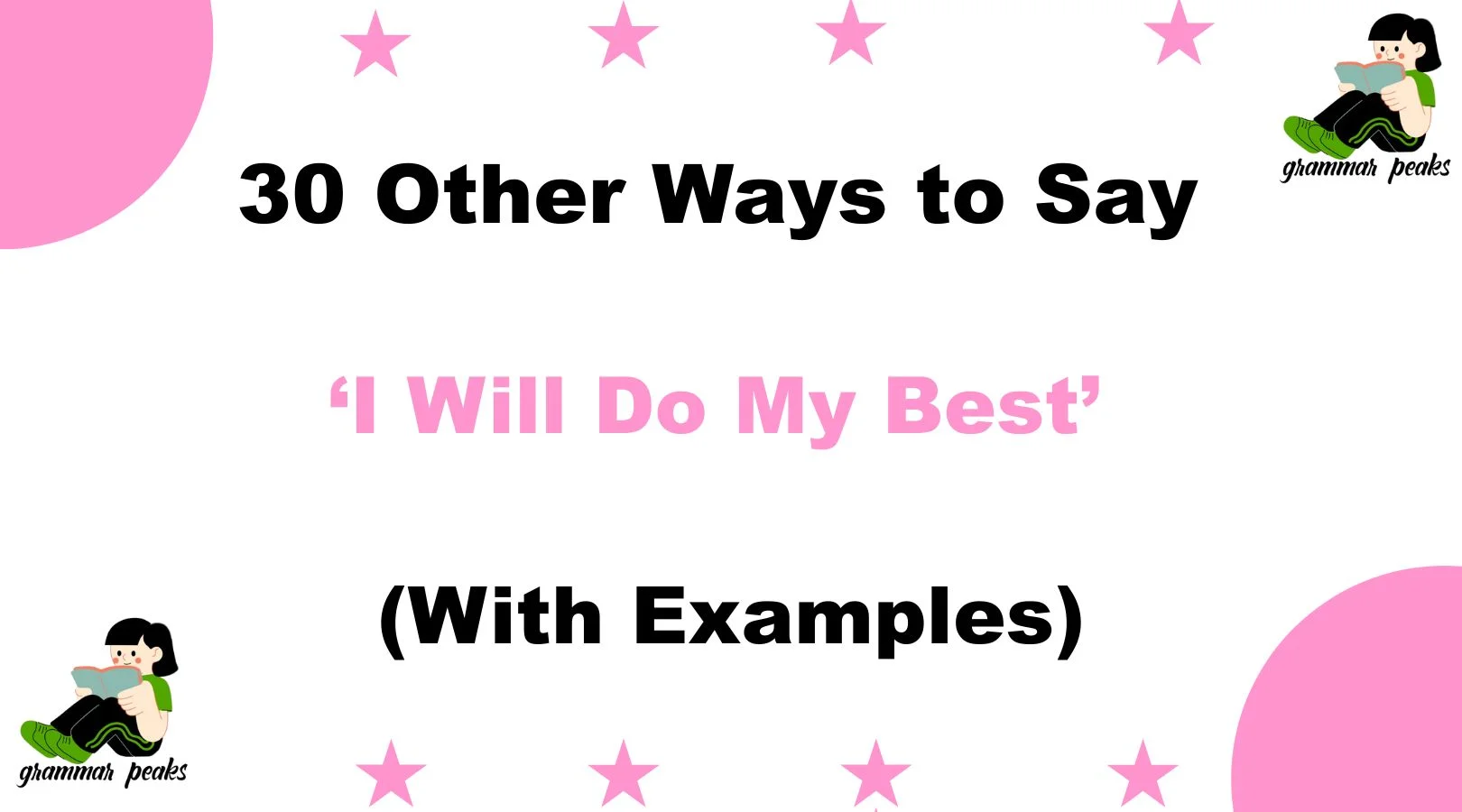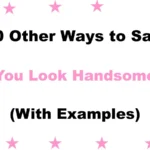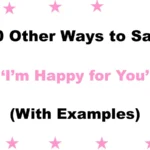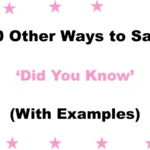Expressing commitment with warmth and clarity in professional settings is essential. Saying “I will do my best” shows dedication, but sometimes finding fresh, thoughtful alternatives can make your message feel even more personal and impact. Using varied phrases allows you to connect better, show empathy, and inspire confidence.
This article offers 30 professional alternatives that help you communicate your genuine effort with care and intention. Each option includes clear definitions, explanations, practical examples, best and worst uses, and tone notes — guiding you to choose the perfect phrase for any occasion.
What Does “I Will Do My Best” Mean?
“I will do my best” is a humble and heartfelt expression that communicates your intention to put in genuine effort, focus, and energy toward a task or responsibility. It doesn’t guarantee a perfect outcome, but it does reflect a sincere commitment to try with full honesty and dedication.
This phrase is often used to reassure others that you’re taking their request seriously and that you’re motivated to deliver. It strikes a balance between confidence and modesty, making it a common go-to in both personal and professional settings where support, trust, or effort is being conveyed.
When to Use “I Will Do My Best”
- When accepting new tasks or responsibilities you haven’t mastered fully.
- To reassure colleagues or clients that you are committed and dependable.
- In situations requiring polite and thoughtful acknowledgment of effort.
- When you want to show a positive attitude despite uncertainty.
Is It Professional/Polite to Say “I Will Do My Best”?
Yes, it is both professional and polite. It shows respect for the task and people involved, reflecting a responsible and earnest approach. However, depending on the situation, sometimes more confident or specific phrases may be preferred.
Pros and Cons of Saying “I Will Do My Best”
Pros:
- Shows humility and dedication.
- Sets realistic expectations.
- Encourages trust through sincerity.
Cons:
- Can sound uncertain or non-committal in high-stakes situations.
- May not convey strong confidence or expertise.
Synonyms for “I Will Do My Best”
- I’m committed to delivering excellent results.
- I will give it my full effort.
- I’ll do everything possible to achieve this.
- You can count on me to handle this.
- I will put my best foot forward.
- I will strive to exceed expectations.
- I’m dedicated to making this work.
- I’ll work hard to get it done.
- I will focus all my energy on this task.
- I’m determined to succeed.
- I will apply myself fully.
- I will prioritize this with care.
- I am ready to give it my all.
- I’ll ensure it gets my best attention.
- I will work diligently toward this goal.
- I’m prepared to tackle this challenge.
- I will do my utmost.
- I’ll take full responsibility.
- I will make this a top priority.
- I’m committed to seeing this through.
- I will endeavor to deliver quality results.
- I’m focused on achieving the best outcome.
- I will give this my wholehearted effort.
- I will do everything in my power to succeed.
- I will do my best to meet your expectations.
- I’m fully engaged in this task.
- I will invest the necessary effort.
- I am dedicated to the task at hand.
- I will work with all my resources.
- I will push myself to achieve this.
1. I’m committed to delivering excellent results.
Definition: This phrase expresses a strong promise to not just try, but to focus on outcomes and high standards.
Detailed Explanation: You’re not just putting in effort—you’re putting in effort with the clear intention of achieving excellent outcomes. It reflects a high standard of responsibility and attention to detail.
Scenario Example: A great way to assure a manager might be: “I understand how important this client is, and I’m committed to delivering excellent results.”
Best Use: Best used when talking to supervisors, clients, or stakeholders who expect excellence and accountability.
Worst Use: Worst in situations where you lack the tools, skills, or resources to guarantee results—it may sound overconfident or risky.
Tone: The tone is professional, confident, and outcome-focused.
2. I will give it my full effort.
Definition: This phrase shows that you plan to put all your energy and focus into the task at hand.
Detailed Explanation: Saying this assures others that you are not holding back—your work will reflect your best energy, attention, and intention.
Scenario Example: You might say to a teammate: “I haven’t used this tool before, but I will give it my full effort.”
Best Use: Best for new tasks, learning opportunities, or team contributions where effort matters most.
Worst Use: Worst when specific expertise or measurable success is needed, since it focuses more on effort than results.
Tone: The tone is encouraging, sincere, and determined.
3. I’ll do everything possible to achieve this.
Definition: This means you’re prepared to go to great lengths to accomplish the goal.
Detailed Explanation: It shows a strong work ethic and resourcefulness, indicating you’ll explore multiple avenues to succeed.
Scenario Example: A reassuring response for a project lead: “This deadline is tight, but I’ll do everything possible to achieve this.”
Best Use: Best in high-pressure or time-sensitive tasks where visible effort and commitment are needed.
Worst Use: Worst in situations where you need to manage expectations more carefully, as it might overpromise.
Tone: The tone is urgent, driven, and solutions-oriented.
4. You can count on me to handle this.
Definition: This phrase emphasizes trustworthiness and dependability.
Detailed Explanation: You’re not just doing your best—you’re offering assurance that you’ll take ownership and follow through reliably.
Scenario Example: Perfect in a team setting: “I know how crucial this report is. You can count on me to handle this.”
Best Use: Best when reassuring teammates or supervisors during collaboration or delegation.
Worst Use: Worst when you’re unsure of your availability or capabilities, as it implies full confidence.
Tone: The tone is reliable, confident, and calming.
5. I will put my best foot forward.
Definition: This phrase expresses your intent to start strong and make a good impression.
Detailed Explanation: Often used when stepping into new situations, it shows you want to present yourself in the most capable and enthusiastic way possible.
Scenario Example: In a job interview, you might say: “Although I’m new to this industry, I will put my best foot forward.”
Best Use: Best when entering new roles, projects, or client relationships where positive first impressions matter.
Worst Use: Worst if used repeatedly—it can sound rehearsed or vague if not backed by specific effort.
Tone: The tone is optimistic, proactive, and polite.
6. I will strive to exceed expectations.
Definition: This phrase shows you’re not only aiming to meet the goal but to go above and beyond.
Detailed Explanation: It expresses an ambition to impress and deliver more than what’s asked, reflecting initiative and excellence.
Scenario Example: In a pitch, you might say: “Thank you for trusting me with this. I will strive to exceed expectations.”
Best Use: Best in competitive or high-visibility tasks, where exceeding the standard is appreciated.
Worst Use: Worst when resources or time are limited, as it may set unrealistic expectations.
Tone: The tone is ambitious, motivated, and confident.
7. I’m dedicated to making this work.
Definition: This communicates strong commitment and persistence, especially in difficult situations.
Detailed Explanation: It’s a warm and genuine way of showing you’ll put in the time, adjust, and persist until you find success.
Scenario Example: On a project call: “There are some hurdles, but I’m dedicated to making this work.”
Best Use: Best in problem-solving, collaborations, or tough timelines.
Worst Use: Worst in situations where you’re unsure of long-term availability, as it implies strong dedication.
Tone: The tone is steady, empathetic, and determined.
8. I’ll work hard to get it done.
Definition: This phrase focuses on the effort and perseverance needed to finish a task.
Detailed Explanation: It reassures others that you’ll remain focused and disciplined until the job is complete.
Scenario Example: Reassuring a supervisor: “It’s a complex task, but I’ll work hard to get it done.”
Best Use: Best for individual tasks or deliverables requiring consistent effort.
Worst Use: Worst if used too casually—it may lack the polish of more formal phrases.
Tone: The tone is diligent, honest, and grounded.
9. I will focus all my energy on this task.
Definition: This emphasizes concentration and full commitment to a specific responsibility.
Detailed Explanation: You’re promising undivided attention, minimizing distractions, and prioritizing the task.
Scenario Example: Sharing priorities with a manager: “I’ve cleared my schedule—I will focus all my energy on this task.”
Best Use: Best in time-sensitive or mission-critical tasks that demand deep focus.
Worst Use: Worst in multitasking situations—it may sound unrealistic if you’re juggling other duties.
Tone: The tone is intense, responsible, and focused.
10. I’m determined to succeed.
Definition: This phrase communicates strong internal motivation and willpower to reach the goal.
Detailed Explanation: It’s a bold way to show you’ve made up your mind to win or solve the problem, no matter what.
Scenario Example: You could say in a performance review: “Despite early setbacks, I’m determined to succeed.”
Best Use: Best when facing challenging goals where resilience and optimism are key.
Worst Use: Worst if spoken too early—before fully understanding the task, it may sound naive.
Tone: The tone is bold, confident, and motivational.
11. I will apply myself fully
Definition: This phrase means committing your complete focus and energy to a task or goal.
Detailed Explanation: When you say “I will apply myself fully,” you’re communicating that you’ll contribute all your effort, intelligence, and time to make something successful. It carries a tone of sincerity and professional intent.
Scenario Example: I understand the importance of this deadline, and I will apply myself fully to ensure it’s met.
Best Use: In project launches or goal-setting meetings to show dedication.
Worst Use: When casual effort is expected; may sound overcommitted.
Tone: Professional, sincere, committed
12. I will prioritize this with care
Definition: This phrase means you’ll thoughtfully give the task top attention and manage it responsibly.
Detailed Explanation: It’s a polished way to show you’re taking responsibility while still balancing other priorities. It assures the other party that the work won’t be rushed or neglected.
Scenario Example: I appreciate the urgency of this request, and I will prioritize this with care to ensure accuracy.
Best Use: When discussing timelines or urgent requests.
Worst Use: When speaking casually or in highly informal communication.
Tone: Polite, careful, respectful
13. I am ready to give it my all
Definition: This means you’re mentally and emotionally prepared to offer everything you have toward the task.
Detailed Explanation: It’s a warm, emotionally intelligent expression of total effort, often used to inspire trust or demonstrate commitment during a challenge.
Scenario Example: This project matters to me, and I am ready to give it my all from day one.
Best Use: In motivational or collaborative team settings.
Worst Use: In overly technical or clinical settings.
Tone: Supportive, enthusiastic, driven
14. I’ll ensure it gets my best attention
Definition: This phrase shows that you will be focused, alert, and avoid distractions in delivering quality work.
Detailed Explanation: It’s both polite and efficient. It signals attention to detail and professionalism without overstating capacity.
Scenario Example: I know this is a key priority, and I’ll ensure it gets my best attention this week.
Best Use: In client responses, team updates, and professional commitments.
Worst Use: When you may not actually have time; risks sounding hollow.
Tone: Reliable, composed, professional
15. I will work diligently toward this goal
Definition: You will be consistent, careful, and hardworking in achieving the objective.
Detailed Explanation: It highlights consistency and effort over time, showing not just intention but long-term focus.
Scenario Example: I will work diligently toward this goal to meet all outlined expectations.
Best Use: In reports, performance reviews, or formal plans.
Worst Use: In very informal chats; sounds too stiff.
Tone: Formal, dependable, focused
16. I’m prepared to tackle this challenge
Definition: You’re ready, confident, and capable of handling a difficult task.
Detailed Explanation: This communicates readiness and initiative, especially in response to new responsibilities or pressure.
Scenario Example: I’ve reviewed the requirements, and I’m prepared to tackle this challenge head-on.
Best Use: In problem-solving or strategy meetings.
Worst Use: For small or routine tasks.
Tone: Assertive, proactive, confident
17. I will do my utmost
Definition: You’ll give your highest effort and leave no stone unturned.
Detailed Explanation: A polished, formal version of saying “I’ll try my very best,” often used to communicate genuine effort in professional writing.
Scenario Example: I will do my utmost to meet the expectations and timeline we discussed.
Best Use: In formal business emails or job interviews.
Worst Use: In casual texts or team banter.
Tone: Respectful, diligent, formal
18. I’ll take full responsibility
Definition: You are willingly accepting ownership for the task or outcome.
Detailed Explanation: More than just effort, this highlights accountability and leadership — valuable in collaborative settings or high-stakes scenarios.
Scenario Example: I’ll take full responsibility for delivering the results by Friday.
Best Use: In leadership roles or managing expectations.
Worst Use: If you’re not fully empowered to own the task.
Tone: Accountable, respectful, mature
19. I will make this a top priority
Definition: You will treat the task as one of your highest importance items.
Detailed Explanation: It’s a clear signal of prioritization — often expected when handling executive requests or client-facing work.
Scenario Example: I understand how important this is, and I will make this a top priority on my schedule.
Best Use: In scheduling or stakeholder communication.
Worst Use: When juggling too many “top priorities” — it can lose meaning.
Tone: Respectful, focused, responsive
20. I’m committed to seeing this through
Definition: You’re expressing unwavering dedication to finishing the task completely.
Detailed Explanation: It shows endurance, reliability, and care — a great way to reassure someone who’s relying on you.
Scenario Example: Even with the added complexity, I’m committed to seeing this through to completion.
Best Use: For long-term or complex projects.
Worst Use: For small or minor tasks — sounds like overkill.
Tone: Dependable, reassuring, determined
21. I will endeavor to deliver quality results
Definition: You’ll strive with full effort to meet a high standard.
Detailed Explanation: This is a well-crafted phrase that blends humility with professionalism — ideal for formal communication.
Scenario Example: I will endeavor to deliver quality results that align with the project goals.
Best Use: In job applications, client updates, or performance reviews.
Worst Use: In overly casual or fast-paced exchanges.
Tone: Polished, thoughtful, formal
22. I’m focused on achieving the best outcome
Definition: Your attention is fully aimed at delivering the most positive results.
Detailed Explanation: This communicates clarity and commitment — it assures others that their goals are aligned with yours.
Scenario Example: I’m focused on achieving the best outcome and will adjust as needed to stay on track.
Best Use: When leading a project or collaborating cross-functionally.
Worst Use: When outcomes are uncertain or out of your control.
Tone: Optimistic, strategic, focused
23. I will give this my wholehearted effort
Definition: You’ll contribute not just skill but also passion and enthusiasm.
Detailed Explanation: This adds emotional sincerity to your commitment — useful in trust-building or emotionally intelligent leadership.
Scenario Example: I care deeply about this mission and will give this my wholehearted effort.
Best Use: In team settings, employee motivation, or volunteer initiatives.
Worst Use: In cold or highly technical communications.
Tone: Warm, personal, motivating
24. I will do everything in my power to succeed
Definition: You are ready to exhaust every reasonable option to make things work.
Detailed Explanation: This phrase combines intensity and assurance. It’s best for moments of high stakes or complex challenges.
Scenario Example: I will do everything in my power to succeed and bring this across the finish line.
Best Use: In leadership, fundraising, or crisis situations.
Worst Use: If you don’t actually control the outcome.
Tone: Powerful, earnest, determined
25. I will do my best to meet your expectations
Definition: You aim to fulfill the standards or hopes others have of you.
Detailed Explanation: It’s polite and modest — while still signaling effort. It’s especially effective when navigating performance expectations.
Scenario Example: I will do my best to meet your expectations on this task.
Best Use: In client or supervisor communication.
Worst Use: When too vague; may require specificity.
Tone: Courteous, honest, respectful
26. I’m fully engaged in this task
Definition: You’re mentally present and committed to active progress.
Detailed Explanation: It assures others that your time and attention are centered on the current priority.
Scenario Example: I’m fully engaged in this task and have already made meaningful progress.
Best Use: In progress reports or stakeholder updates.
Worst Use: If distractions or delays are still happening.
Tone: Active, focused, transparent
27. I will invest the necessary effort
Definition: You’re ready to dedicate the energy required for success.
Detailed Explanation: This is a balanced phrase — showing effort without overpromising.
Scenario Example: I will invest the necessary effort to ensure this is completed successfully.
Best Use: For planning, budgeting, or strategic goals.
Worst Use: When expectations demand more than effort alone.
Tone: Professional, practical, realistic
28. I am dedicated to the task at hand
Definition: You’re giving your full commitment and focus to the current task.
Detailed Explanation: This communicates presence, reliability, and task ownership — great for team and leadership contexts.
Scenario Example: I am dedicated to the task at hand and will see it through with care.
Best Use: Team stand-ups or sprint planning.
Worst Use: If you’re known to multitask often — could sound insincere.
Tone: Steady, composed, assured
29. I will work with all my resources
Definition: You’ll bring everything available — skills, tools, time — to achieve the result.
Detailed Explanation: This showcases resourcefulness and professional maturity — ideal when complexity is involved.
Scenario Example: I will work with all my resources to ensure we reach the milestone.
Best Use: In project planning or cross-functional teamwork.
Worst Use: In simple requests that don’t need full resourcing.
Tone: Confident, methodical, professional
30. I will push myself to achieve this
Definition: You’ll go beyond your comfort zone to accomplish the goal.
Detailed Explanation: This reveals your willingness to stretch yourself — not just with time, but growth. It’s motivational and humble at once.
Scenario Example: This goal matters to me, and I will push myself to achieve this.
Best Use: In ambitious settings, leadership growth, or coaching.
Worst Use: In overworked or burnout-prone contexts.
Tone: Ambitious, motivational, personal
Conclusion
Finding the right alternative to “I will do my best” isn’t just about swapping words—it’s about choosing phrases that reflect your intent, effort, tone, and professionalism. Whether you’re communicating with clients, teams, or leadership, these 30 alternatives allow you to express care, commitment, and confidence with more precision. Thoughtful phrasing doesn’t just boost clarity—it builds trust, credibility, and deeper connection in your professional communication.
FAQs
1. Can I use these phrases in a job interview?
Yes—many of these alternatives are perfect for interviews, especially those that show dedication, focus, and a willingness to learn or grow.
2. Are all of these professional enough for workplace communication?
Absolutely. Each phrase is carefully selected to be professional, respectful, and empathetic, suitable for emails, meetings, and leadership settings.
3. How do I choose the best alternative for a situation?
Focus on your tone and audience. Use softer phrases for collaborative moments, and stronger ones when showing leadership or resilience.
4. Should I avoid saying “I will do my best” altogether?
Not at all. It’s still a kind and humble phrase—but using varied language shows emotional intelligence and communication skills.
5. Do these alternatives help with performance reviews or written evaluations?
Yes. They allow you to communicate your contributions, effort, and attitude more clearly—perfect for self-assessments and peer reviews.






